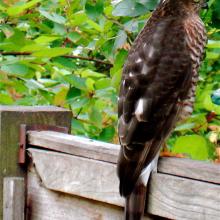
One Spurtle team member sat in the smirr on Saturday afternoon as part of the RSPB's Big Garden Bird Watch – an annual hour-long mass observation designed to give an accurate picture of various bird species' numbers and distribution across the country.
As reported – ironically enough – on Twitter, in his East Claremont Street backgreen there were no birds whatsoever. A solitary blackbird briefly took the mick from nextdoor's drying post, but otherwise nothing. Not even the usually raucous and omnipresent magpies put in an appearance.
Other local observers also reported reduced bird numbers, which experts tentatively ascribe to this winter's severe conditions. Spurtle had begun to fear Broughton was a bird-free zone.
And then a Cochran Terrace resident contacted us with better news. In the same BGBW event he observed 15 species: Goldfinch (7), Greenfinch (6), Chaffinch (5), Blackbird (2), Dunnock (3), Wren (1), Long Tailed Tit (1), Blue Tit (2). Great Tit (2), Robin (1), Pied Wagtail (1), Feral pigeon (5), Woodpigeon (2), Crow, Magpie. 'Outside of the given hour we also had Redwing, Fieldfare, Blackcap, Mistle Thrush and various Gulls', he wrote, adding insult to injury.
Now warming to his theme, he continued: 'In addition to those seen yesterday, we also get the following in the garden: Coal Tit, Waxwing, Redwing, Fieldfare, Song Thrush, Blackcap, Black Headed Gull, Herring Gull and Collared Dove'. Above is his photograph of a juvenile Sparrow Hawk, photographed in Cochran Terrace in 2010.
What is the secret of this ornithological abundance? It appears that backgreen banqueting may hold the key. 'I do feed them regularly. Seem to spend more time feeding them than I do feeding myself these days. Their favourite foods are: Niger Seed – Goldfinch/Greenfinch only; Black Sunflower – Greenfinch and Tits; Hemp Seed – Greenfinches go MAD for it; Apples – Thrush family; Mealworm – Everyone, particularly Robins.'
This remarkable local naturalist prefers – like the innumerable Golden Eagle and Great Bustard of East Claremont Street – to keep a low profile, and has asked Spurtle not to give his name. We shall return to another of his remarkable local discoveries at a later date.
In the meantime, we welcome more Broughton readers' BGBW and other wildlife reports.